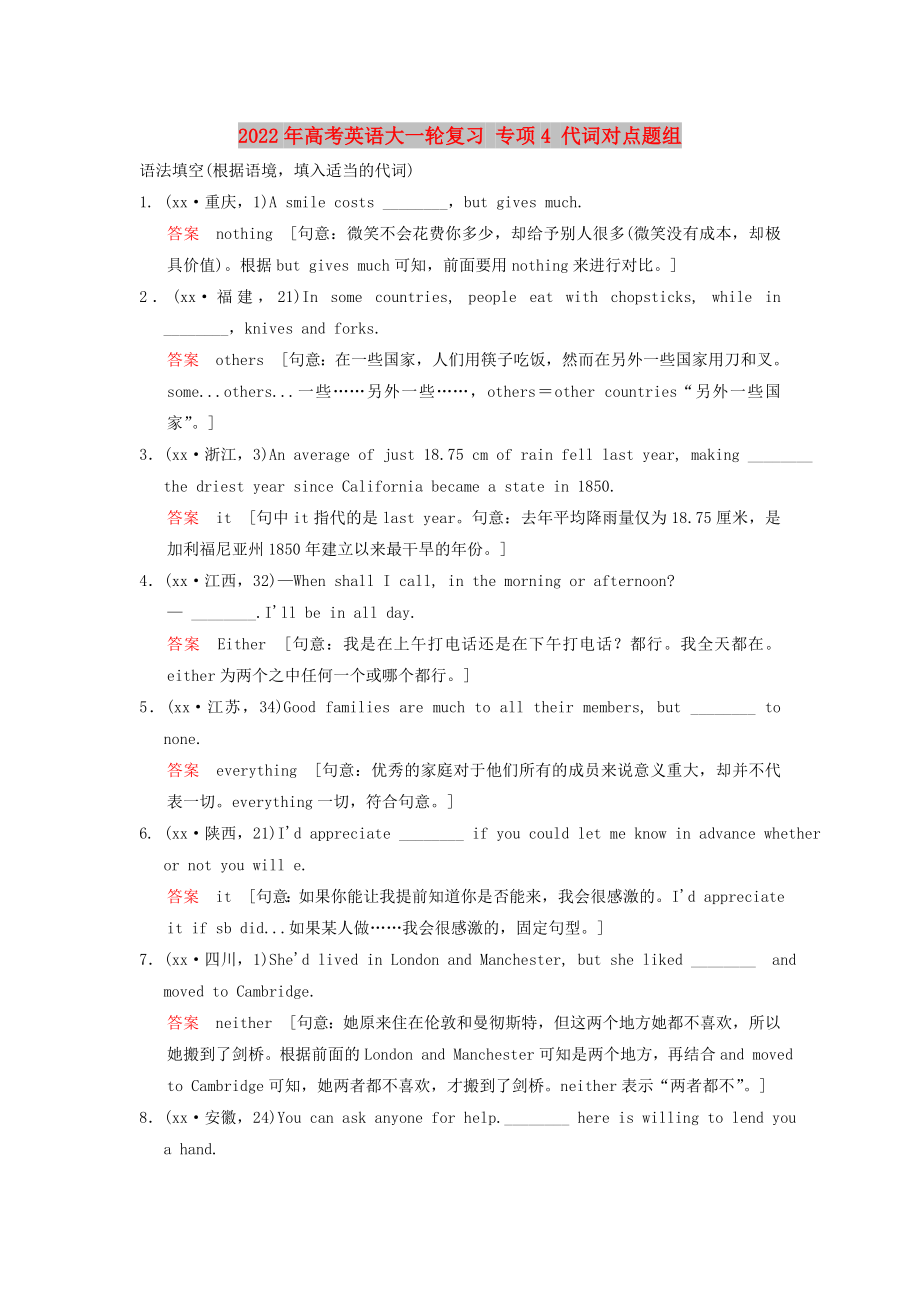《2022年高考英語大一輪復(fù)習(xí) 專項(xiàng)4 代詞對(duì)點(diǎn)題組》由會(huì)員分享,可在線閱讀��,更多相關(guān)《2022年高考英語大一輪復(fù)習(xí) 專項(xiàng)4 代詞對(duì)點(diǎn)題組(2頁珍藏版)》請(qǐng)?jiān)谘b配圖網(wǎng)上搜索�����。
1�����、2022年高考英語大一輪復(fù)習(xí) 專項(xiàng)4 代詞對(duì)點(diǎn)題組
語法填空(根據(jù)語境����,填入適當(dāng)?shù)拇~)
1. (xx·重慶�,1)A smile costs ________,but gives much.
答案 nothing [句意:微笑不會(huì)花費(fèi)你多少���,卻給予別人很多(微笑沒有成本��,卻極具價(jià)值)����。根據(jù)but gives much可知,前面要用nothing來進(jìn)行對(duì)比�����。]
2.(xx·福建��,21)In some countries, people eat with chopsticks, while in ________����,knives and forks.
答案 others [句意:在一些國家
2、���,人們用筷子吃飯�����,然而在另外一些國家用刀和叉����。some...others...一些……另外一些……�,others=other countries“另外一些國家”�。]
3.(xx·浙江����,3)An average of just 18.75 cm of rain fell last year, making ________ the driest year since California became a state in 1850.
答案 it [句中it指代的是last year。句意:去年平均降雨量僅為18.75厘米�����,是加利福尼亞州1850年建立以來最干旱的年份�。]
4.(xx·江
3、西����,32)—When shall I call, in the morning or afternoon?
— ________.I'll be in all day.
答案 Either [句意:我是在上午打電話還是在下午打電話?都行��。我全天都在��。either為兩個(gè)之中任何一個(gè)或哪個(gè)都行�����。]
5.(xx·江蘇�����,34)Good families are much to all their members, but ________ to none.
答案 everything [句意:優(yōu)秀的家庭對(duì)于他們所有的成員來說意義重大�,卻并不代表一切。everything一切�����,符合句意����。]
6
4、. (xx·陜西��,21)I'd appreciate ________ if you could let me know in advance whether or not you will e.
答案 it [句意:如果你能讓我提前知道你是否能來����,我會(huì)很感激的。I'd appreciate it if sb did...如果某人做……我會(huì)很感激的��,固定句型����。]
7.(xx·四川,1)She'd lived in London and Manchester, but she liked ________ and moved to Cambridge.
答案 neither [句意:她原
5����、來住在倫敦和曼徹斯特�,但這兩個(gè)地方她都不喜歡�����,所以她搬到了劍橋���。根據(jù)前面的London and Manchester可知是兩個(gè)地方����,再結(jié)合and moved to Cambridge可知����,她兩者都不喜歡,才搬到了劍橋�����。neither表示“兩者都不”����。]
8.(xx·安徽����,24)You can ask anyone for help.________ here is willing to lend you a hand.
答案 One [句意:你可以請(qǐng)求任何人幫忙�����,這兒的每個(gè)人都樂意幫助你�。根據(jù)句意可知應(yīng)選everyone�。]
9. (xx·山東,4)Susan made ________ clear to me that she wished to make a new life for herself.
答案 it [句意:蘇珊明確向我表明��,她想為自己謀得一份新生活�����。此處it作形式賓語����,而真正的賓語為that引導(dǎo)的賓語從句。]
10. (xx·大綱版全國卷����,25)—Who's that at the door?
— ________ is the milkman.
答案 It [句意:“誰在大門那兒?”“是送牛奶的人����。”當(dāng)不能確定對(duì)方的性別或身份時(shí)常用it指代某人。]
 2022年高考英語大一輪復(fù)習(xí) 專項(xiàng)4 代詞對(duì)點(diǎn)題組
2022年高考英語大一輪復(fù)習(xí) 專項(xiàng)4 代詞對(duì)點(diǎn)題組

